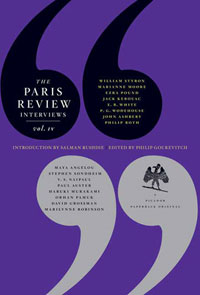That Write Stuff

Now that I am more kindly disposed toward The Paris Review--the literary institution founded by George Plimpton and a cohort of his pals back in the wild and crazy 1950s--since they have dropped the hyperbolic "DNA of literature" slogan, I am pleased to pass on the news of the newest volume of The Paris Review Interviews (Picador) and in fact, the offering of a slip-covered set of all the extant volumes.
Some of the interviewees in this volume include Ernest Hemingway, T.S. Eliot, Kurt Vonnegut, Elizabeth Bishop, Richard Price, Joan Didion, Gabriel García Márquez, Philip Larkin, James Baldwin, Toni Morrison, Stephen King, Robert Lowell, Ralph Ellison, Joyce Carol Oates, Raymond Carver, Salman Rushdie, Martin Amis, Maya Angelou, Haruki Murakami, Paul Auster, Marilynne Robinson, and, of course many more.
Old pal Colum McCann, an excitable boy, enthuses:
The Paris Review
While I am at it I feel compelled to make mention of a number of recent interviews that, if not indispensable, are significant by virtue of their subjects. There is no one like Gore Vidal for both his grasp of American history and clear-eyed, unsentimental analysis. His chat in London with Johann Hari features such gems as:
I was like everyone else when Obama was elected--optimistic. Everything we had been saying about racial integration was vindicated," he says, "but he's incompetent. He will be defeated for re-election. It's a pity because he's the first intellectual president we've had in many years, but he can't hack it. He's not up to it. He's overwhelmed. And who wouldn't be? The United States is a madhouse. The country should be put away--and we're being told to go away. Nothing makes any sense." The President "wants to be liked by everybody, and he thought all he had to do was talk reason. But remember--the Republican Party is not a political party. It's a mindset, like Hitler Youth. It's full of hatred. You're not going to get them aboard. Don't even try. The only way to handle them is to terrify them. He's too delicate for that.
And for good measure the Atlantic offers up a snappy Q&A notable for:
In one recent interview, you referred to FDR as a great man.
But you opposed his foreign policy.
How do you reconcile that with your affection for him?
And for good measure:
Who is the best leader in the Democratic Party right now?
Cormac McCarthy (Blood Meridien) reportedly finds interviews anathema (which explains their dearth), but he recently sat down with John Jurgensen and director John Hillcoat (The Road) in San Antonio and chatted about this and that including the forthcoming theatrical release of the film based on The Road. My favorite quote:
WSJ
CM
Recently I mentioned Umberto Eco's latest project and book and coincidentally Der Spiegel published a detailed conversation with Don Umberto that is most illuminating indeed.
